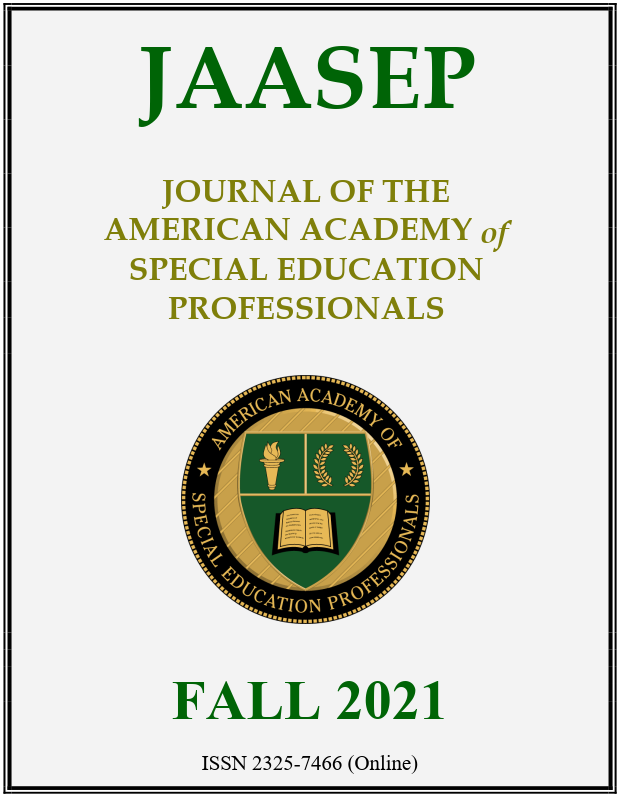Educational Leaders’ Perspectives on their Preparation, Practice, and Professional Development in Multi-Tiered Systems of Support
Averill, O. H., & Rinaldi, C. (2011). Multi-tier system of supports. District Administration, 47(8), 91-94.
Batsche, G. (2006) Response to intervention: Competing views. Assessment for Effective Intervention, 32, 6-19. DOI: https://doi.org/10.1177/15345084060320010301
Bineham, S., Shelby, L., Pazey, B., & Yates, J. (2014). Response to intervention: Perspectives of general and special education professionals. Journal of School Leadership, 24(2), 230-252. DOI: https://doi.org/10.1177/105268461402400201
Braun, D., Gable, R., & Kite, S. (2011). Situated in a community of practice: Leadership preparation practices to support leadership in K-8 schools. National Council of Professors of Educational Administration, 6(1), 1-17.
Briggs, K., Cheney, G. R., Davis, J., & Moll, K. A. (2013). Operating in the dark: What outdated state policies and data gaps mean for effective school leadership. George W. Bush Institute, Education Reform Initiative.
Brown-Chidsey, R. & Bickford, R. (2016) Practical Handbook of Mult-Tiered Systems of Support: Building Academic and Behavioral Success in Schools. The Guilford Press, New York.
Darling-Hammond, L., LaPointe, M., Meyerson, D., Orr, M. T., & Cohen, C. (2007). Preparing school leaders for a changing world: Lessons from exemplary leadership development programs. Stanford, CA: Stanford University, Stanford Educational Leadership Institute. DOI: https://doi.org/10.59656/EL-PP1968.002
Dulaney, S., Hallam, P., & Wall, G. (2013). Superintendent perceptions of multi-tiered systems of support (MTSS): Obstacles and opportunities for school system reform. AASA Journal of Scholarship and Practice, 10, 2.
Edmonds, C., Waddle, J., Murphy, C., Ozturgut, O., & Caruthers, L. (2005). Leading the learning: What Missouri principals say about their preparation programs. AASA Journal of Scholarship and Practice, 3(4), 14-21.
Eddy, P. & Rao, M. (2009). Leadership development in higher education programs. Community College Enterprise, 15(2), 7-26.
Hoover, J., Baca, L., Wexler-Love, E., & Saenz, L. (2008). National implementation of response to intervention (rti): Research summary. National Implementation of RTI (Special Education Leadership and Quality Teacher Initiative BUENO center-School of Education, University of Colorado, Boulder), 1-14.
Horner, R. H., & Halle, J. W. (2020). Implications of Emerging Educational Reforms for Individuals with Severe Disabilities. Research & Practice for Persons with Severe Disabilities, 45(2), 75–80. https://doi-org.silk.library.umass.edu/10.1177/1540796919872210 DOI: https://doi.org/10.1177/1540796919872210
Hughes, C., & Dexter, D. D. (2011). Universal screening within a response-to-intervention model. Retrieved October, 31, 2011.
Kovaleski, J. (2007). Response to intervention: Consideration for research and systems change. School Psychology Review, 36(4), 638-646. DOI: https://doi.org/10.1080/02796015.2007.12087924
Kratochwill, T. R., Clements, M. A., & Kalymon, K. M. (2007). Response to intervention: Conceptual and methodological issues in implementation. In Handbook of response to intervention (pp. 25-52). Springer, Boston, MA. DOI: https://doi.org/10.1007/978-0-387-49053-3_3
Lashley, C. (2007). Principal leadership for special education: An ethical framework. Exceptionality, 15, 177-187. DOI: https://doi.org/10.1080/09362830701503511
Leithwood, K., Alma, H., Hopkins, D. (2008). Seven strong claims about successful school leadership. School Leadership and Management, 28(1), 27-42. DOI: https://doi.org/10.1080/13632430701800060
Leonard, K. M., Coyne, M. D., Oldham, A. C., Burns, D., & Gillis, M. B. (2019). Implementing MTSS in Beginning Reading: Tools and Systems to Support Schools and Teachers. Learning Disabilities Research & Practice (Wiley-Blackwell), 34(2), 110–117. https://doi-org.silk.library.umass.edu/10.1111/ldrp.12192 DOI: https://doi.org/10.1111/ldrp.12192
Massachusetts Department of Elementary & Secondary Education. (2019) Massachusetts Tiered System of Supports: A Blueprint for Educators. https://static1.squarespace.com/static/57f030b95016e13a6d42e810/t/5d8bca826412ab652b3ec336/1569442436213/MTSS_Blueprint_FINAL_2019+%28002%29.pdf.
McHatton, P., Boyer, N., Shaunessy, E., & Terry, P. (2010). Principals’ perceptions of preparation and practice in gifted and special education content: Are we doing enough? Journal of Research on Leadership Education, 5(1), 1-22. DOI: https://doi.org/10.1177/194277511000500101
McMaster, K. L. & Wagner, D. (2007). Monitoring response to general education instruction.
In Handbook of response to intervention (pp. 223-233). Springer, Boston, MA. Mellard, D., Prewett, S., & Deshler, D. (2012). Strong leadership for rti success. Principal Leadership, 12(8), 28-32.
Metcalf, T. (2008). What’s your plan? Accurate decision making within a multi-tier system of supports: Critical areas in Tier 1. Retrieved from: http://www.rtinetwork.org/essential/tieredinstruction/tier1/accurate-decision-making-within-a-multi-tier-system-of-supports-critical-areas-in-tier-1.
Pazey, B. & Cole, H. (2013). The role of special education training in developing socially just leaders: Building an equity consciousness in educational leadership programs. Educational Administration Quarterly, 49(2), 243-271. DOI: https://doi.org/10.1177/0013161X12463934
Schwierjohn, C. A. (2011). Identifying key factors in implementing and sutaining Response to Intervention: A comparison of schools currently implementing RtI. ProQuest LLC. 789 East Eisenhower Parkway, PO Box 1346, Ann Arbor, MI 48106.
Spanneut, G., Tobin, J., Ayers, S. (2012). Identifying the professional development needs of public school principals based on the Interstate School Leader Licensure Consortium Standards. NASSP Bulletin, 96(1) 67-88. DOI: https://doi.org/10.1177/0192636512439230
Sugai, G. & Simonsen, B. (2012). Positive behavior and supports: history, defining features, and misconceptions. PBIS Revisited, 1-8.
Vogel, L., & Weiler, S. C. (2014). Aligning preparation and practice: An assessment of coherence in state principal preparation and licensure. NASSP Bulletin doi. 0192636514561024. DOI: https://doi.org/10.1177/0192636514561024
Wakeman, S., Browder, D., Flowers, C., & Ahlgrim-Delzell, L. (2006). Principals’ knowledge of fundamental and current issues in special education. NASSP Bulletin, 90(2), 153-174. DOI: https://doi.org/10.1177/0192636506288858
Ziomek-Daigle, J., Goodman-Scott, E., Cavin, J., & Donohue, P. (2016). Integrating a multi-tiered system of supports with comprehensive school counseling programs. The Professional Counselor, 6(3) 220-232. DOI: https://doi.org/10.15241/jzd.6.3.220
